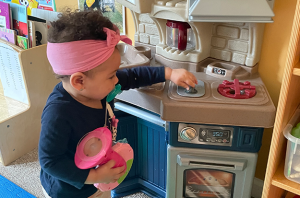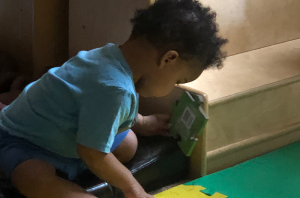Daycare is a necessary component of early childhood development, not just a useful tool for working parents. From improving social skills to accelerating cognitive development, childcare offers a whole setting where kids flourish. This article explores the many ways in which child daycare providers help to shape young brains and equip them for success in the future. We will look at 10 main areas where childcare improves early learning and development, showing how these settings help to produce well-rounded, confident, and competent children.
Social Skills Development
Children often engage with their classmates in childcare. This setting supports their learning of group working, communication, and sharing. Success, both personally and academically, depends on these social abilities. Regular contact also helps kids become sympathetic to and understanding of others. Playing and learning together helps them to identify and value many emotions and points of view, which are essential for developing future successful relationships.
Emotional Growth
Daycare environments provide planned activities meant to promote emotional growth. Youngsters pick up skills in controlling emotions and developing connections with individuals outside their homes. As they meet little hurdles and grow from them, this environment also helps them become resilient. Through activities that inspire kids to attempt new things and investigate their aptitudes, they go through a spectrum of emotions. Children who get this emotional coaching develop steadiness in their emotions and confidence.
Cognitive Skills Enhancement
Daycare environments provide planned activities meant to promote emotional growth. Youngsters pick up skills in controlling emotions and developing connections with individuals outside their homes. As they meet little hurdles and grow from them, this environment also helps them become resilient. Through activities that inspire kids to attempt new things and investigate their aptitudes, they go through a spectrum of emotions. Children who get this emotional coaching develop steadiness in their emotions and confidence.
Language Skills
Interacting with other children and caregivers improves vocabulary and language abilities. Many times, daycare providers have deep talks with their students to help them to express themselves better. Their language skills improve by virtue of this exposure to fresh vocabulary and sentence construction. Furthermore, enhancing their language abilities and enabling children to grasp the rhythm and flow of words—qualities necessary for language acquisition—are group projects that include singing songs and reading poetry.
Routine and Structure
Young children first encounter a disciplined atmosphere in daycare. This schedule promotes behavioral development by helping children feel safe and know what is expected of them. For kids, a regular routine also helps to lower anxiety as they know what to anticipate all through the day. This consistency allows kids to focus on their tasks and engage in good peer interaction, therefore supporting stability and security.
Exposure to Diversity
Children from all backgrounds abound in childcare facilities. Children’s viewpoints are expanded, and acceptance is encouraged by exposure to many cultures and customs. Understanding several ways of life enables kids to value variety and creates a cooperative and respectful atmosphere. Such exposure is a basic step towards producing open-minded people who are at ease in many environments.
Physical Development
Physical activity options abound at daycare centers. Development of motor abilities and enhancement of health and well-being depend on these kinds of exercises. Games and play that promote running, leaping, and other motions improve physical coordination and strength and help people regularly engage in physical activity. These pursuits also help youngsters learn early on the value of health and fitness, therefore preparing them for good practices throughout their lives.
Creativity and Play
Early childhood learning depends on play in great part. Creative activity available in daycare facilities boosts creativity and artistic expression. Youngsters participate in activities like painting, sketching, and constructing that not only provide entertainment value but also stimulate problem-solving and creative thought. Cognitive growth depends on these events, which also provide kids with an enjoyable approach to communicating their feelings and thoughts.
Independence and Confidence
Children who spend time apart from their parents come to trust other people and become confident in their own talents. Under expert supervision, daycare provides a safe environment for developing independence. It gives kids plenty of chances to make choices and take ownership of their behavior, therefore strengthening their self-esteem and getting them ready for the demands of life and education.
Preparation for School
Daycare gets kids ready for the move to official education. It teaches letters and numbers and helps kids get used to being away from home during class. Early exposure to a classroom helps one adjust to more regimented learning environments. Youngsters who go to daycare are frequently more flexible and ready for the group learning that is standard in most institutions.
Conclusion
Early childhood development depends much on daycare facilities as they provide disciplined and caring surroundings. They assist kids in acquiring critical skills in a conducive environment, therefore preparing them for future social and academic success. Daycares are great in creating a firm basis for young children as their activities are meant to support cognitive, social, and emotional development. These facilities, as we have seen, give children the skills they need for lifetime learning and adaptation, therefore transcending their mere care. Parents who want to offer their children a fantastic start in life and guarantee their continuous development and progress depend on selecting the appropriate daycare.


